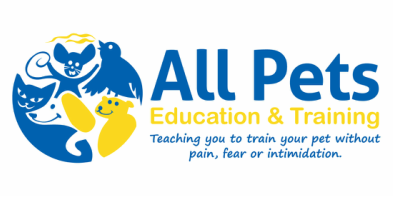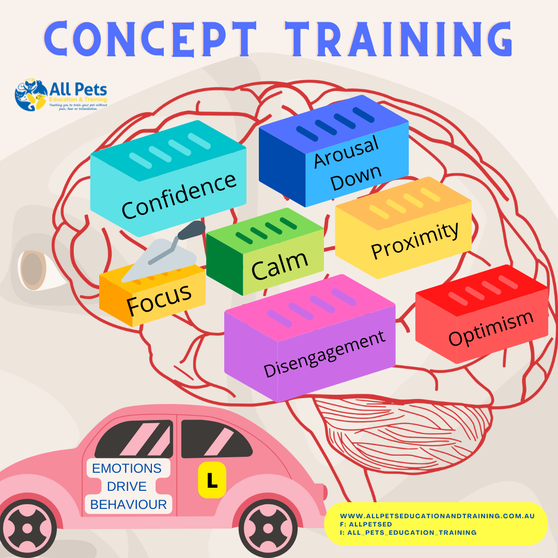Concept Training
Exactly what is it?
Feb 2022
What is concept training?
When I say that I am a concept trainer, it is a new way at looking at how we train our pets.
Instead of focusing on the behaviour that we want to change, we think about how the animal feels about a certain thing, and what “concept” needs to grow to overcome this. Growing concepts will change the structure of our dog’s brain, and in response to this the emotions that they feel. Emotions drive behaviour.
So, let’s think of the dog’s brain (and human brain for that matter).
Each animal will have strengths and weaknesses within their personality and mindset make up. This can change, which means that through carefully selected training and scenarios we can sculpt and develop these areas all for the better, and in doing so, influence and re shape our personalities.
Now let’s consider that a brain is made up of various concepts. These concepts are like building blocks. Some can be super strong, and some might be weak and need some strengthening before we can rely on them, and maybe some just need replacing with a different style of block.
Concepts that we are considering might be worth growing would include OPTIMISM, AROUSAL UP or AROUSAL DOWN, DISENGAGEMENT, FOCUS, CALMNESS, THINKING IN AROUSAL, TOLERANCE OF FRUSTRATION, PROXIMITY, CONFIDENCE, INDEPENDENCE etc.
How skilled they are at any particular concept influences the choices they make in day-to-day life, and all the concepts combined make up that dog’s unique personality. (Absolute Dogs)
As mentioned before your dogs brain can have blocks added, strengthened or replaced. Which means we can change how they feel and therefore how they behave over time.
So we begin by assessing the animal and the individual struggles. And from here we pick the concepts that need the most growth.
Next we pick some simple games specific for these concepts – we want easy wins to begin with.
Why? Dopamine is the molecule of more. The more you do something and enjoy it, the more you want to do it again.
Once we’ve chosen games, based on the individual in front of us and their individual struggle, we next choose how and went to practice
It’s important to note, I have a multiple dog household and each dog has their own individual training plan – there may be overlap, but its definitely not one program for each and every dog.
With our chosen games, we practice out of the situation that the struggles occur in, before ever expecting them to work in the situation. Therefore, we train for the situation, not in the situation. (Mitchell and Langman)
“The brain is a highly efficient organ; it is geared towards saving energy so it will become more efficient over time. The way it does that is by adapting to what it is doing day in and day out”. (Mitchell and Langman)
Playing games with your dog gives them the tools they need to grow. It does this as it reshapes their brain, and changes how they feel or think about the world, as a result changing the emotions and the behaviour they display.
An example:
Optimism games, in turn, boost optimism, make your dog’s outlook more optimistic and, therefore, in day-to-day life they are totally cool about…..
.....that loud noise that suddenly happens
.....the dog that kind of freezes in the distance and gives your dog ambiguous signals
.....or that strange looking guy with the beard and the wizard’s hat! (Absolute Dogs)
While growing the concepts, it is also important to manage your dog and prevent rehearsal of the behaviours etc that you don’t want to see. Management stops rehearsal. An example might be if your dog is fence running and barking at the postman, lets keep him inside or in the back yard when the postman comes by. Give him another job to and practice the games for disengagement and calmness out of the situation. Once he has perfected them, you can start gradually adding in more distractions etc and giving your dog more and more responsibility for their choices.
Why do we stop rehearsal, well because rehearsal is powerful.
What a dog has always done in a situation, he will continue to do – unless we do something about it! (Mitchell)
Management however is not the be all and end all, it is part of a training program.
If you want to learn more, please touch base, or you can read Dr Tom Mitchell’s book called How to be a concept trainer and read here to learn more about emotions and behaviour.
Works Cited
Absolute Dogs. “CONCEPT TRAINING.” AbsoluteDogs, 12 Feb. 2019, absolute-dogs.com/blogs/news/concept-training-1. Accessed 20 Feb. 2022.
Mitchell, Tom. How to Be a Concept Trainer. London & Hong Kong, Printworks Global, 2017.
Mitchell, Tom, and Lauren Langman. Real-Life Results Dog Training Transformation. London, The Choir Press, 2020.
When I say that I am a concept trainer, it is a new way at looking at how we train our pets.
Instead of focusing on the behaviour that we want to change, we think about how the animal feels about a certain thing, and what “concept” needs to grow to overcome this. Growing concepts will change the structure of our dog’s brain, and in response to this the emotions that they feel. Emotions drive behaviour.
So, let’s think of the dog’s brain (and human brain for that matter).
Each animal will have strengths and weaknesses within their personality and mindset make up. This can change, which means that through carefully selected training and scenarios we can sculpt and develop these areas all for the better, and in doing so, influence and re shape our personalities.
Now let’s consider that a brain is made up of various concepts. These concepts are like building blocks. Some can be super strong, and some might be weak and need some strengthening before we can rely on them, and maybe some just need replacing with a different style of block.
Concepts that we are considering might be worth growing would include OPTIMISM, AROUSAL UP or AROUSAL DOWN, DISENGAGEMENT, FOCUS, CALMNESS, THINKING IN AROUSAL, TOLERANCE OF FRUSTRATION, PROXIMITY, CONFIDENCE, INDEPENDENCE etc.
How skilled they are at any particular concept influences the choices they make in day-to-day life, and all the concepts combined make up that dog’s unique personality. (Absolute Dogs)
As mentioned before your dogs brain can have blocks added, strengthened or replaced. Which means we can change how they feel and therefore how they behave over time.
So we begin by assessing the animal and the individual struggles. And from here we pick the concepts that need the most growth.
Next we pick some simple games specific for these concepts – we want easy wins to begin with.
Why? Dopamine is the molecule of more. The more you do something and enjoy it, the more you want to do it again.
Once we’ve chosen games, based on the individual in front of us and their individual struggle, we next choose how and went to practice
It’s important to note, I have a multiple dog household and each dog has their own individual training plan – there may be overlap, but its definitely not one program for each and every dog.
With our chosen games, we practice out of the situation that the struggles occur in, before ever expecting them to work in the situation. Therefore, we train for the situation, not in the situation. (Mitchell and Langman)
“The brain is a highly efficient organ; it is geared towards saving energy so it will become more efficient over time. The way it does that is by adapting to what it is doing day in and day out”. (Mitchell and Langman)
Playing games with your dog gives them the tools they need to grow. It does this as it reshapes their brain, and changes how they feel or think about the world, as a result changing the emotions and the behaviour they display.
An example:
Optimism games, in turn, boost optimism, make your dog’s outlook more optimistic and, therefore, in day-to-day life they are totally cool about…..
.....that loud noise that suddenly happens
.....the dog that kind of freezes in the distance and gives your dog ambiguous signals
.....or that strange looking guy with the beard and the wizard’s hat! (Absolute Dogs)
While growing the concepts, it is also important to manage your dog and prevent rehearsal of the behaviours etc that you don’t want to see. Management stops rehearsal. An example might be if your dog is fence running and barking at the postman, lets keep him inside or in the back yard when the postman comes by. Give him another job to and practice the games for disengagement and calmness out of the situation. Once he has perfected them, you can start gradually adding in more distractions etc and giving your dog more and more responsibility for their choices.
Why do we stop rehearsal, well because rehearsal is powerful.
What a dog has always done in a situation, he will continue to do – unless we do something about it! (Mitchell)
Management however is not the be all and end all, it is part of a training program.
If you want to learn more, please touch base, or you can read Dr Tom Mitchell’s book called How to be a concept trainer and read here to learn more about emotions and behaviour.
Works Cited
Absolute Dogs. “CONCEPT TRAINING.” AbsoluteDogs, 12 Feb. 2019, absolute-dogs.com/blogs/news/concept-training-1. Accessed 20 Feb. 2022.
Mitchell, Tom. How to Be a Concept Trainer. London & Hong Kong, Printworks Global, 2017.
Mitchell, Tom, and Lauren Langman. Real-Life Results Dog Training Transformation. London, The Choir Press, 2020.

